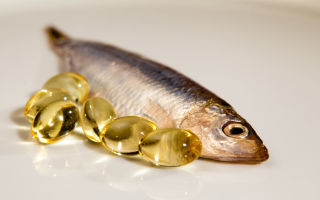Content
- 1 What vitamins are found in fish
- 2 Nutritional value and calories in fish
- 3 The benefits of fish for the human body
- 4 Why fish is useful for children
- 5 Fish for weight loss
- 6 Which fish is healthier: river or sea
- 7 Are dried and dried fish useful?
- 8 The benefits and harms of smoked fish
- 9 What is the healthiest fish for humans
- 10 Healthy fish recipes
- 11 Harm to fish and contraindications to use
- 12 How to choose quality fish
- 13 How and how much fish can be stored
- 14 Conclusion
The benefits and harms of fish make it an integral part of the diet of many people. The valuable nutritional, dietary and even medicinal properties of the product have a beneficial effect on the body and bring it high dividends.
What vitamins are found in fish
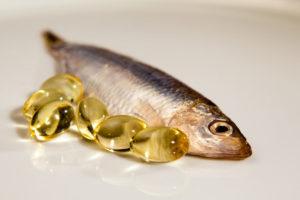
The benefits of fish in human nutrition are significant and multifaceted. It is saturated with substances useful to humans. There are proteins, polyunsaturated fatty acids (PUFA), amino acids, lipids, fish oil, iodine, and minerals. The vitamin composition of fish meat deserves special attention. It should be noted that this indicator is much higher in marine species than in freshwater ones. There are vitamins that show versatile beneficial properties:
- AND - strengthens visual function, maintains a healthy condition of the skin, hair, mucous membranes, respiratory and gastrointestinal tract, prevents cancer;
- D - prevents diseases of the heart, blood vessels, including Alzheimer's disease, and also helps to get rid of depression, osteoporosis (ensures the absorption of Ca and P), increases immunity, mental and physical activity;
- F - these are essential fatty acids called arhidonic, linoleic linolenic. They are not produced in the human body, so they must be present in food. Reduce the concentration of "harmful" cholesterol, protect cells from damage and degeneration into malignant structures, accelerate lipid metabolism, and, when interacting with vitamin D, strengthen the musculoskeletal system;
- E - protects against old age and the diseases that accompany it: skin aging, oncological diseases. Prevents the development of cataracts, maintains immunity, blood pressure and normal heart function. Helps to lose weight;
- C - by its properties, the substance is an antioxidant and a reducing agent. Provides healthy immunity, good mood, a surge of strength and energy, participates in the elimination of cholesterol. Its concentration is much lower than in plant products;
- PP - regulates cholesterol levels, helps maintain glucose levels during physical activity, fights free radicals;
- H - participates in the processing of glucose, supports the work of the nervous system, helps to assimilate proteins, promotes burning of fats, and also makes the skin silky, elastic, and gives the hair volume and shine;
- group B - first of all, it is riboflavin, thiamine, pyridoxine. Fish is especially rich in vitamin B12, which is very important for the vital activity of blood cells.
Nutritional value and calories in fish

The nutritional content and energy content, as well as the beneficial properties of fish, can vary. It depends on the species and habitat.The fat content can vary from 2% to 15% or more. The calorie content also changes. But no matter how fatty the fish is, meat in terms of saturation with fats is several times higher than it in these indicators, as well as in harm to human health. Therefore, marine and freshwater inhabitants are considered a dietary product with significant beneficial properties.
The benefits and harms of fish for the body, calorie content, vary depending on the technological, culinary processing applied to the product. Salting, drying, smoking significantly affect these indicators. Fried fish has the highest calorie content, which is harmful to the body and neutralizes most of the beneficial properties of the original product. Therefore, it is recommended to boil it and consume it without adding additional fat. This also applies to vegetable oils, an excessive amount of which can cause significant harm to the figure.
The nutritional composition of fish is richer and more varied than that of meat. The chemical compounds present in it have useful properties and a therapeutic effect. Everyone is well aware of the benefits of fish oil, cod liver, etc.
The benefits of fish for the human body

With frequent use, the medicinal properties of the fish become noticeable. It is quickly digested and does not stay inside the digestive tract, unlike meat and poultry. This is due to the difference in the structure of muscle fibers, which do not have a dense, hard-to-digest shell and due to this they begin to be absorbed in the first place. This explains the beneficial dietary properties of the product.
Fatty fish that live in northern waters contain Omega-3 PUFAs, the beneficial properties of which help to avoid the development of cardiovascular pathologies, improve peripheral blood circulation, and reduce the risk of thrombosis. All this contributes to the prevention of early death from heart disease. At the same time, you should know that there is almost no Omega-3 in red fish grown under artificial conditions, and therefore there are fewer useful properties.
Marine species need to be eaten to improve thyroid function. They contain a high concentration of iodine, the beneficial properties of which have a huge impact on humans. This element is necessary for the production of thyroid hormones. The most noticeable amount of iodine is found in pollock, tuna, flounder, tuna, pink salmon, the beneficial properties of which are well known to everyone.
Fish oil will have a beneficial effect on visual function due to the properties of PUFA and vitamin A. These chemical compounds strengthen vision and prevent the development of night blindness. Cholesterol is present in both river and marine species. However, there is very little of it here and, unlike meat, it does not cause any harm. In addition, marine life contributes to the elimination of excess cholesterol due to the presence of the beneficial properties of PUFAs. Unfortunately, river fish has no effect on reducing the harm of cholesterol in the body.
Why fish is useful for children

Fish dishes for children are an ideal product, saturated with useful substances: easily digestible proteins, necessary during the period of intensive growth, vitamin D, calcium, phosphorus. They help to form the musculoskeletal system, make it possible to develop mentally, physically, and to be highly active.
What kind of fish can you give your child
The healthy properties of fish dishes must be present in the child's diet. They saturate with vital nutrients. But not every variety can be given to children because of the possible harm to an incompletely formed organism that does not function as efficiently as in adults.
Children can be fed low-fat or semi-fat marine varieties that are beneficial for an early age.The former include hake, pike perch, flounder, cod, river perch, navaga, and the latter - sea bass and crucian carp, herring, trout, and others. Herring, mackerel, salmon are not suitable for baby food and can be harmful. The health benefits of river fish for children are significantly less.
Fish for weight loss
In the composition of low-calorie diets, it is often advised to introduce fish dishes instead of meat. They contain the useful properties necessary for this: they are easier to digest, they have a rich vitamin and mineral composition, which will be useful under strict dietary restrictions. However, the properties of fatty species are not suitable for these purposes due to their high calorie content: they are more likely to harm the figure than save it from extra pounds.
But even the most healthy unleavened varieties in terms of dietary properties should not be fried or smoked. Additional culinary processing does not give food benefits, but extra calories and salt. You should not fill the finished carcasses with a large amount of oil, even if it is vegetable. The benefits of steamed fish, boiled and baked dishes are well known.
Which fish is healthier: river or sea
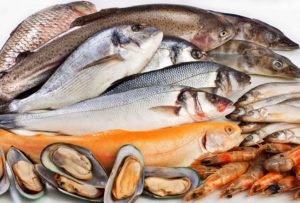
Each species has its own characteristics of the chemical composition. The benefits of river fish for the human body are high protein content, low calorie content. But it is still better to give preference to marine species, since they are cleaner, contain more rare and irreplaceable nutrients, have better taste and health properties. Due to the presence of fatty acids, vision, heart, and nervous system function well. Fans of fish delicacies have a higher intelligence, working capacity, tumor diseases are much less common, and they live longer.
Are dried and dried fish useful?
The health benefits of dried fish are the increased concentration of nutrients. There are more beneficial properties of Omega acids, vitamins, minerals. But dried fish also has a high concentration of salt, which can provoke the development of diseases of the joints, heart, blood vessels, and complicate the work of the kidneys. It is not recommended to buy homemade goods anywhere on the market, from hands. The benefits and harms of dried fish depend on the way it is processed. Improper salting or drying does not kill helminth larvae, and they enter the human body.
The greatest benefits of dried fish are manifested in the event that the technological processing of the product took place in the factory. It includes careful selection of raw materials, compliance with all the nuances of production. In the case of hand-bought goods, this cannot be said: the fish can be caught in a polluted reservoir or cooked in violation of the processing process. Then the benefits of dried fish for humans becomes doubtful.
The benefits and harms of smoked fish

Hot smoked fish does not bring much benefit. The properties of such a processing technology to emit harmful carcinogenic substances neutralizes all the useful qualities of the product. The highest concentration of such compounds is present in smoked fish. At high temperatures, carcinogenic substances accumulate more quickly on the skin of the fish and penetrate deep into the depths more intensively.
The most dangerous are considered thin-skinned varieties: herring, mackerel, herring, capelin, cooked over a fire. Factory-made hot-smoked fish will have less harm and hazardous properties. The most useful in this regard are thick-skinned cold-smoked fish varieties (carp, catfish, trout, bream).
So, the benefits and harms of smoked fish depend on its type and method of processing: hot or cold.
What is the healthiest fish for humans
Fresh fish are believed to have more health benefits than frozen fish. But this is not always the case. Indeed, some of the substances are destroyed by exposure to low temperatures. But fresh fish also has vulnerabilities. It quickly deteriorates, which negatively affects its quality and makes it capable of causing harm to the consumer.
Therefore, it is often better to purchase frozen fish that have been frozen immediately after the catch. As a result, the benefits of such a product may be higher.
There is an interesting misconception common among humans. For some reason, the most useful properties are given to red fish. But as chemical analysis of the composition of both species shows, this is far from the case. It is enough to compare some characteristics:
|
Substances |
Red |
White |
|
Fat, g (which fish is more caloric) |
8,12 |
0,61 |
|
Proteins, g Necessary for the exchange, increasing muscle mass. |
20,1 |
16,2 |
|
Phosphorus,% of the daily value Strengthens dental and bone tissue, helps kidneys, nervous system. |
26,2 |
26,2 |
|
Calcium,% Strengthens the bone apparatus, the central nervous system, participates in the work of the adrenal glands, thyroid, pancreas, gonads, pituitary gland. |
1.6 |
2,6 |
|
Vitamin B12,% It improves memory, concentration and attention, gives a boost of energy, balances the activity of the nervous system, and prevents anemia. |
0 |
54 |
|
Omega-3, g Regulates cholesterol levels, improves the condition of blood vessels, protects nerve cells, joints, and prevents cancer. |
1,4 |
0,3 |
The greatest benefits of marine fish for the daily diet, as can be seen from the table, are in the white varieties. In addition, they are not only healthier, but also much cheaper than red ones.
Healthy fish recipes
Salted fish is often saturated with dyes, preservatives, and flavorings. Therefore, to guarantee beneficial properties, it is better to cook it at home. To do this, you need to purchase the following ingredients:
- any red fish;
- coarse sea salt;
- granulated sugar;
- coarsely chopped dill.
You only need to take a fresh carcass. With self-salting, it is better to cook fillets, although in production conditions it can be salted whole. You need to do the following:
- Sprinkle salt on the foil.
- Place the fillet on top.
- Sprinkle with salt.
- Add a pinch of sugar.
- Spread the dill on the surface.
- Wrap the fish completely in foil.
- Put in the refrigerator for at least a day.
Fish baked with vegetables
- 1 large carcass of any fish;
- 2 carrots;
- 1 head of onion;
- mayonnaise or mustard with vegetable oil;
- salt to taste;
- seasoning for fish.
Cooking steps:
- The carcass is gutted, washed, cut into pieces together with a ridge 2 - 3 cm thick.
- The pieces are laid out in a mold.
- Mix mayonnaise with salt and seasonings or mustard with 2 tablespoons of vegetable oil and grease fish pieces.
- Leave to soak for up to half an hour.
- Cut carrots and onions into rings, mix with cooked pieces.
- If desired, add broccoli, bell peppers, olives and more to taste.
- Send the form hot to 170 aboutC oven for 15 minutes, during baking increase to 200 aboutC. A browned crust is a sign of readiness.
Harm to fish and contraindications to use
The desire to buy more fish is not always justified.The fact is that large individuals, as a rule, are older, which means that they have more accumulations of heavy metal salts.
The most toxic are carnivorous species (tuna, navaga, pollock, nelma, hake, pink salmon, beluga, chinook salmon), since the food chain is interrupted for them. Predators can accumulate large amounts of mercury. And the older the individual, the more toxins it contains. Therefore, you should not use large carcasses of predatory fish for food, especially for pregnant women: mercury can cause serious disturbances in the development of the fetus.
The widespread opinion about the absence of parasites in marine life, in comparison with river ones, is a myth. Sea fish also contain helminth larvae, such as anicasid. They can get along in almost any form. And if they get into a person, they can cause intestinal ulcers. Fish parasites are infected by eating raw, slightly salted, undercooked or undercooked fish.
Do not get carried away with vacuum-packed red fish. It does not guarantee high quality. Especially if the label indicates that the product has been processed in accordance with TU, and not with GOST. In addition to salt, such packaging may contain various toxic substances: phosphates, dyes, stabilizers.
How to choose quality fish
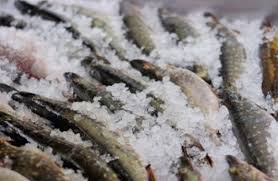
Ideally, if there is no food allergy, fish will be useful in the diet of every person. Better to buy live or at least fresh fish. In the absence of such an opportunity, it is necessary to choose the right frozen fish. However, it is difficult to determine the degree of its freshness. Unscrupulous traders often take advantage of this and offer a poor quality product. What you need to know:
- It is undesirable to buy fish without a head. It is from this part of the body that it begins to deteriorate, and low-quality goods go to freeze.
- Particular attention should be paid to the eyes and gills. By their condition, one can easily determine the quality of the product: whether it was frozen fresh. The eyes should be light, protruding, not sunken; the gill covers and fins should be tightly compressed, not protruding.
- The shape of a freshly frozen carcass will be intact. If it has lost its appearance and the correct shape, it means that it has already been defrosted more than once.
- The color of a quality product is uniform, the scales are shiny or silvery. Areas that stand out against the general background - whitish spots, a yellowish tint on the belly - indicate a stale product.
- The weight of the fish should not be small. If the carcass is unnaturally light, it means that it has been stored in the freezer for a long time and has dried out: its meat will easily break off and have a bland taste.
When choosing fresh fish, you need to pay attention to the following features:
- the smell should be, sea, salt, without foreign inclusions;
- when pressed with a finger, the fish body should spring, and the trace from this almost immediately disappears;
- the gills should be saturated with blood, have a dark color.
More about the rules for choosing fish - in the video:
How and how much fish can be stored
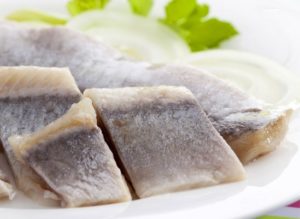
Fresh carcasses can stay in the refrigerator for no more than 2 days. For such storage, they need to be gutted, washed, dried with a towel. Then cut into pieces, place in the marinade or sprinkle with coarse salt. At the end of the two-day period, the fish must be consumed.
Store fish dishes at room temperature for no more than 2 hours. Before placing them in the refrigerator, they must be covered with a lid and wrapped in plastic wrap.It is advisable to use the product within two days, since further boiled fish will lose its benefits and become unsuitable for food.
Conclusion
The benefits and harms of fish largely depend on its type or variety. But in general, we can say that this is a valuable dietary product that a person needs to maintain full health.

